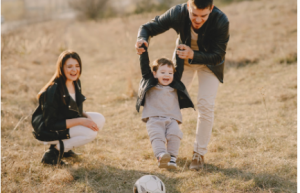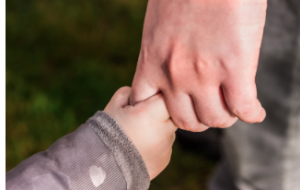National Childhood Abuse Prevention Month
By Erica Marriaga, MSW, LCSW

April is national Child Abuse Prevention Month. National Child Abuse Prevention Month “recognizes the importance of families and communities working together to strengthen families to prevent child abuse and neglect.”
Every child has significant needs when growing up. Think about it for a moment. Regardless if you are a parent, aunt, uncle, grandparent, child, sibling, what was given to you when you were younger? Did you have shelter, food, safety, water? Do you remember not having some of these things? How about emotional needs? If those things were not provided to you, were you able to rely on yourself?
The common denominator in all cases of abuse and neglect are linked to the relationship between parent/guardian/caregiver and child/adolescent.
According to the NJ Department of Children and Families, abuse is the physical, sexual or emotional harm or risk of harm to a child under the age of 18 caused by a parent or other person who acts as a caregiver for the child.
Neglect occurs when a parent or caregiver fails to provide proper supervision for a child or adequate food, clothing, shelter, education or medical care although financially able or assisted to do so.
Types of Abuse and Warning Signs
Sexual Abuse can range from inappropriate touching of a child’s genitals to rape, indecent exposure, and exploitation. Sexual abuse can have many different layers, impacting the emotional well-being of the victim. There are many physical and behavioral warning signs that might indicate a child has been abused.
- Pain when walking or sitting and discomfort in area site
- Fear and avoidance of a specific person
- Knowledge of age-inappropriate sexualized behaviors
- Uncomfortable changing in front of others
- Withdrawn behavior and isolation
- Urge to run away
- Regression to younger age (ie, bed wetting)
Physical Abuse ranges from minor bruises to severe fractures or death. Many times, physical abuse may go unnoticed if bruises have healed and are not visible without close examination. Physical abuse is a non-accidental physical injury to a child caused by a parent, caregiver, or other person responsible for a child. This might include punching, kicking, biting, choking, or throwing. Objects might also be used to inflict physical harm.
- Unexplained bruises or burns on face, mouth, back
- Reappear after extended time spent with family member
- Wear inappropriate clothing comparative to weather
- Fear of parents, not wanting to go home
- Aggressive behavior
- Fearful of adult contact
Emotional Abuse/Psychological Abuse can be extremely hurtful and damaging. Years and years of hateful words can harm a child/adolescent in extreme ways. A pattern of behavior that impairs a child’s emotional development or sense of self-worth is damaging. Emotional abuse consists of constant criticism, belittling, or demoralizing comments. Degrading statements, cursing, such as “You should have never been born, get out of my face, you are a disgrace.” Refraining from showing affection and love are also impactful.
- Withdrawn from relationships
- Extreme behaviors including aggression, compliant, demanding, and passive
- Act mature at young age versus acting immature when older
- Lack of attachment to parent or caregiver
Neglect is the failure of a parent or other caregiver to provide for a child’s basic needs. This means that a combination of responsibilities are not consistent. As discussed earlier, significance of not having food, shelter, and supervision is paramount in development. In addition, medical, educational, and emotional neglect exist.
- Hunger
- Poor hygiene
- Medical illness
- Disruptions with school attendance
- Substance use
- Reports no parent present
- Extra time spent at school
- Delinquency
Risk Factors Increasing Likelihood of Child Abuse/Neglect
- Domestic Violence
- Divorce
- Parental Incarceration
- Parental Substance Use
- Untreated Parental Mental Illness
Create a Dependable and Consistent Environment at Home

Thinking of trying out some new parenting techniques? The Nurtured Heart Approach can help transform the way we view ourselves and our children.
Set aside time to have a family night and build a close relationship. Provide positive reinforcement and praise for accomplishments and provide encouragement and gentle, constructive feedback for failures.
Allow children to participate in making appropriate family decisions. This helps them see value in their role in the family. What are they contributing to? This will also help them with their self-esteem.
Helping Prevent Child Abuse in Your Community
- Ask your city mayor to sign a “Child Abuse Prevention Month Proclamation.”
- Sign a Promise of Prevention and make a difference in the life of a child.
- Plant a Pinwheel Garden. The pinwheel is reflective of the bright future all children deserve. For more information visit Prevent Child Abuse America (PCA America) website at www.preventchildabuse.org
- Wear a “pinwheel” pin during the month of April. For more information visit Prevent Child Abuse America (PCA America) website at www.preventchildabuse.org
- The 2021 Resource Guide identifies protective factors and ways to create and maintain healthy family relationships.
You might have noticed that you or someone you know can relate to information that has been provided. If so, you have come to the right place in receiving extra support.
A licensed therapist or counselor can help you be the best parent you can be.

Erica Marriaga is a proud fur-mama of her one-eyed rescue dog, Toby, and new puppy, Tucker. She loves to spend time with her husband and bond with her family, nieces, and nephews. Erica is passionate and enthusiastic about her role as a therapist.
Check out Erica’s professional bio here!
EWC has locations in Manalapan and Shrewsbury, NJ, and accepts a variety of insurances.
Email Us: info@exceptionalwellnesscounseling.com
Call Now: (908) 415-2042
NEXT STEPS & RESOURCES
- Are you ready to take your first step? Reach out to us.
- Do you feel your child may benefit from counseling during this time? Take the first step.
- Interested in online counseling? Learn more.
- Resources
